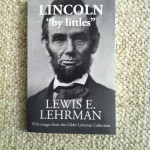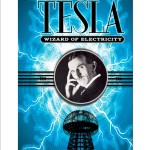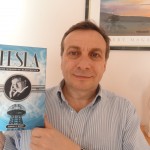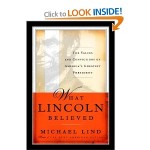 What happens when you mix deadly microbes with religious zealots with animal rights activists? You get an extremely entertaining and well written mystery thriller by debut novelist Sam Hawksworth.
What happens when you mix deadly microbes with religious zealots with animal rights activists? You get an extremely entertaining and well written mystery thriller by debut novelist Sam Hawksworth.
The book opens with a man being transferred against his will from a deep maximum security prison – “a clean version of hell” – and we quickly learn about the book’s title. An archaea is a single celled microorganism that by itself is safe and not pathogenic. But what happens if it is combined with a pathogenic component? As archaea are easily transmitted we suddenly have a mechanism for a worldwide epidemic of the attached pathogen. This one causes infertility, something that the secret organization manufacturing it sees as a plus. Unfortunately, it has the inconvenient side effect of being fatal to about a quarter of a million women worldwide.
That’s the starting point for a wild ride that intertwines the lives of an Ivy League professor, an FBI team out of Boston, a trio of animal rights activists concerned about a secret, paramilitary-protected compound in Texas, a few anti-abortion fanatics, and a smattering of white supremacists, all with their own reasons for supporting, or fighting, the cause.
Hawksworth deftly communicates the intricacies of biological agents while giving us insights into the motives and rationales of each character and group. Questions of morality and societal responsibility are raised as the book skates along the difficult issues of overpopulation and disease. His plot twists keep the story moving, and not always in the direction you think it is going. I found myself racing through the pages, eager to find out what happens next.
The book is available as an ebook through Amazon’s digital services and for a price so low that it was an easy decision to take a chance on an unknown author. I’m glad I did. I thoroughly enjoyed this book and highly recommend it.
[NOTE: I periodically do reviews of some of the books I’m reading. This fiction book has a nice science aspect to it that I found fascinating. Click and scroll down for other book reviews.]
David J. Kent is the author of Tesla: The Wizard of Electricity. You can order a signed copy directly from me, download the ebook at barnesandnoble.com, and find hard copies exclusively at Barnes and Noble bookstores.
Follow me by subscribing by email on the home page. And feel free to “Like” my Facebook author’s page and connect on LinkedIn. Share with your friends using the buttons below.



 Periodically on this site I provide reviews of books about Abraham Lincoln. This is a review of Lincoln “by littles” by Lewis E. Lehrman, published by The Lehrman Institute in 2013.
Periodically on this site I provide reviews of books about Abraham Lincoln. This is a review of Lincoln “by littles” by Lewis E. Lehrman, published by The Lehrman Institute in 2013. Busy day here in Tesla-land, but here’s a quick update on what is going on with Tesla: The Wizard of Electricity.
Busy day here in Tesla-land, but here’s a quick update on what is going on with Tesla: The Wizard of Electricity. A short update on Tesla: The Wizard of Electricity. In a word, woo hoo! (Hmm, that might be two words, but you get the picture.)
A short update on Tesla: The Wizard of Electricity. In a word, woo hoo! (Hmm, that might be two words, but you get the picture.)


 I recently received a copy of a new book and was asked to read it and write a book review. This is that review.
I recently received a copy of a new book and was asked to read it and write a book review. This is that review. Each born on February 12, 1809 in very different parts of the world, Abraham Lincoln and Charles Darwin never met. Darwin spent five years traveling the world on The Beagle and eventually defined how we think about life. Lincoln spent four years staying pretty much in Washington DC and eventually came to define how we think of leadership.
Each born on February 12, 1809 in very different parts of the world, Abraham Lincoln and Charles Darwin never met. Darwin spent five years traveling the world on The Beagle and eventually defined how we think about life. Lincoln spent four years staying pretty much in Washington DC and eventually came to define how we think of leadership. Still, the book toggles between Lincoln’s life and Darwin’s life, comparing the two at key junctures in their maturation as thinkers, family men, and leaders. Because they were the same age many of these life choices occurred at roughly the same period of time. Contosta notes that both put off making decisions as to their life’s work since neither really wanted to follow too closely in the footsteps of their fathers. Lincoln traveled down the Mississippi on a flat boat before settling for some years in New Salem, Illinois. Darwin traveled around the world by ship for five years doing the research that would eventually lead to his most famous works. Once this phase was completed they each “found their calling,” Lincoln in politics and the law, Darwin in development and experimentation on what would eventually be called evolution.
Still, the book toggles between Lincoln’s life and Darwin’s life, comparing the two at key junctures in their maturation as thinkers, family men, and leaders. Because they were the same age many of these life choices occurred at roughly the same period of time. Contosta notes that both put off making decisions as to their life’s work since neither really wanted to follow too closely in the footsteps of their fathers. Lincoln traveled down the Mississippi on a flat boat before settling for some years in New Salem, Illinois. Darwin traveled around the world by ship for five years doing the research that would eventually lead to his most famous works. Once this phase was completed they each “found their calling,” Lincoln in politics and the law, Darwin in development and experimentation on what would eventually be called evolution. The book spends some time after the early death of Lincoln and the much later death of Darwin to assess their impact on the world. Clearly the emancipation of the slaves and the subsequent problems with reconstruction led to issues experienced for another century (and continuing). And clearly Darwin’s theory of natural selection challenged the conventional thinking of the day. History has shown that many would “adapt” the work of these two influential men to serve their own purposes (e.g., “social Darwinism,” which Darwin would have been aghast to see).
The book spends some time after the early death of Lincoln and the much later death of Darwin to assess their impact on the world. Clearly the emancipation of the slaves and the subsequent problems with reconstruction led to issues experienced for another century (and continuing). And clearly Darwin’s theory of natural selection challenged the conventional thinking of the day. History has shown that many would “adapt” the work of these two influential men to serve their own purposes (e.g., “social Darwinism,” which Darwin would have been aghast to see).






